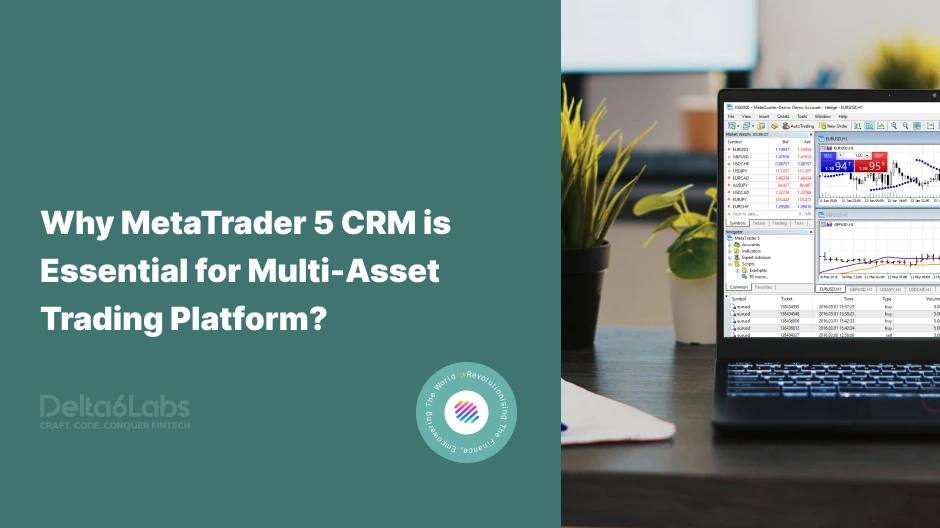Security Challenges in Forex CRM Development and How to Overcome
Table of Contents
A security breach in a forex CRM can compromise sensitive client data, disrupt trading activities, and result in significant financial and reputational losses. Therefore, forex brokers and fintech developers must understand the security challenges in CRM development and adopt proactive strategies to overcome them.
The Importance of Security in Forex CRM Systems
Forex CRMs are at the heart of trading businesses, handling sensitive information like personal data, financial transactions, account details, and compliance documents. With such critical data at stake, they become prime targets for hackers and fraudsters.
A secure CRM not only protects clients’ assets but also builds trust, ensures regulatory compliance, and supports long-term scalability. On the other hand, an insecure CRM risks data leaks, fraudulent activity, phishing attacks, and system downtime, which can severely damage a broker’s credibility.
Major Challenges in Forex CRM Development
Here are some major security challenges in Forex CRM development:
Data Breaches and Unauthorized Access
One of the biggest threats in forex CRM systems is unauthorized access to sensitive client information. Weak authentication protocols, poor password management, or lack of encryption can expose customer data to hackers.
Insider Threats
Employees and contractors with access to CRM data can create security risks if proper access control and monitoring mechanisms are not employed. Insider misuse is often harder to detect and can cause serious damage.
Phishing and Social Engineering
Fraudsters frequently target forex brokers and traders through phishing emails, fake login pages, and social engineering tactics to steal credentials or trick users into fraudulent transactions.
API Vulnerabilities
Forex CRMs integrate with trading platforms, payment gateways, and liquidity providers via APIs. If not properly secured, APIs can serve as entry points for attackers to manipulate data or disrupt services.
Distributed Denial of Service (DDoS) Attacks
Forex businesses rely heavily on uptime and fast execution. A DDoS attack can overwhelm servers, leading to system downtime and loss of trading opportunities, damaging both brokers and clients.
Regulatory Non-Compliance
Global data privacy regulations like GDPR, MiFID II, and other local financial laws mandate strict security controls. Non-compliance with them can result in penalties, license revocation, and reputational harm.
Weak Encryption and Data Storage Practices
Storing sensitive information without strong encryption or secure database practices makes CRM data more vulnerable to hacks and breaches.
Malware and Ransomware Attacks
Forex CRMs, if unprotected, can fall prey to malware injections or ransomware that lock critical systems, leading to business interruptions and financial losses.
Ways to Overcome Security Challenges
Here are few methods by which we can overcome security challenges:
Implement Strong Authentication Mechanisms
Adopt multi-factor authentication (MFA) for both employees and clients. Biometric logins, one-time passwords (OTPs), and device-based authentication add layers of security against unauthorized access.
Enforce Role-Based Access Control (RBAC)
Restrict data access based on employee roles. For example, support staff should not have access to sensitive financial records. Granular permissions ensure minimal exposure of critical data.
Use End-to-End Data Encryption
Encrypt data both in transit and at rest using advanced protocols like AES-256 and TLS. This prevents hackers from intercepting or altering data during communication.
Secure API Integrations
Adopt API authentication keys, throttling, and continuous monitoring to prevent misuse of APIs. Conduct regular penetration tests to identify and fix vulnerabilities.
Regular Security Audits and Penetration Testing
Conduct frequent vulnerability assessments and penetration testing to identify loopholes in CRM systems. Third-party audits also help ensure compliance and strengthen trust.
Protect Against DDoS Attacks
Use DDoS mitigation tools, load balancers, and cloud-based security solutions to distribute traffic and maintain uptime even under attack.
Build a Secure Forex Trading Platform
At Delta6Labs FinTech, we understand that security is the cornerstone of a successful forex trading platform. Our team leverages cutting-edge encryption, AI-driven monitoring, regulatory compliance frameworks, and secure architecture designs to overcome the challenges faced in forex CRM development. By combining technical expertise with industry best practices, we build scalable, resilient, and user-centric platforms that protect client data, ensure uninterrupted trading, and strengthen trust in your brokerage.
Conclusion
A forex CRM is the backbone of modern trading businesses, but its effectiveness depends heavily on how secure it is. With cyberattacks becoming more frequent and sophisticated, brokers cannot afford to overlook security during CRM development. By implementing robust authentication, encryption, regulatory compliance, and continuous monitoring, forex brokers can safeguard client data, maintain uptime, and build trust in an increasingly competitive market.
Frequently Asked Questions
Disclaimer:
The information on this blog is for knowledge purposes only. The content provided is subject to updates, completion, verification, and amendments, which may result in significant changes.
Nothing in this blog is intended to serve as legal, tax, securities, or investment advice of any investment or a solicitation for any product or service.





